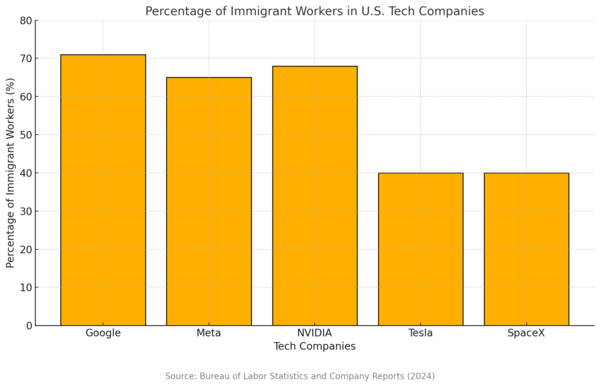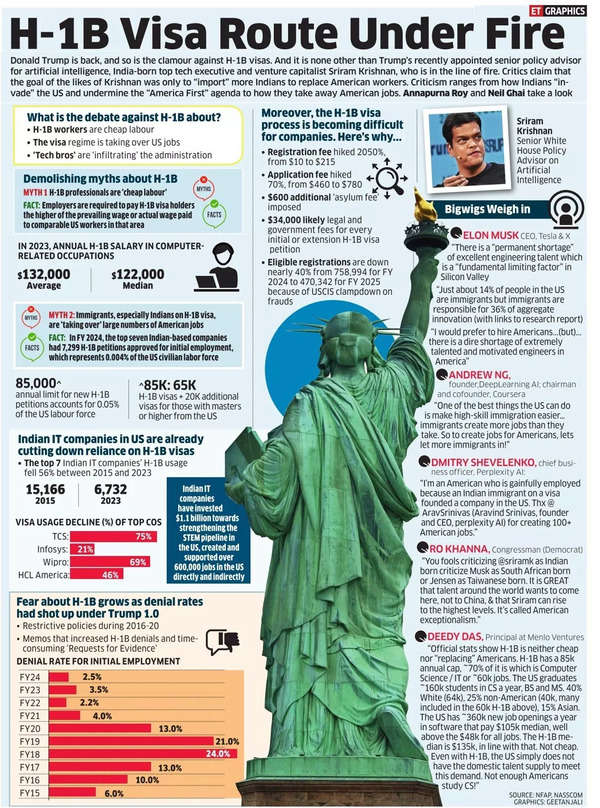“Take a big step back and F* YOURSELF in the face.”**
Even by Elon Musk’s sui generis standards, this post on X (formerly Twitter) was a chef’s kiss of acrimony. His thunderous reply wasn’t aimed at bureaucrats or the usual “blue check” brigade but at a Trump supporter criticizing H-1B visas. Musk’s fiery defense wasn’t just personal; it was a gauntlet thrown down in a battle that has erupted within the Republican tent.
Musk’s Unfiltered Defense of H-1B Visas
“The reason I’m in America, along with so many critical people who built SpaceX, Tesla, and hundreds of other companies that made America strong, is because of H-1B,” Musk wrote. Then, with all the subtlety of a flamethrower (one he probably designed himself), “Take a big step back and F*** YOURSELF in the face. I will go to war on this issue the likes of which you cannot possibly comprehend.” Of course, fans will notice it’s a key line from Tropic Thunder (see post above).
The war cry wasn’t just another Musk moment; it was a mic drop in the middle of an escalating MAGA civil war over skilled immigration.
MAGA vs. Tech Bros: The Immigration Implosion
On one side, you’ve got the tech giants—Musk, Google, Meta, NVIDIA—all staunch advocates of the H-1B visa program. For Silicon Valley, the numbers speak louder than words: over 70% of tech workers in companies like Google, Meta, and NVIDIA are foreign-born, with many arriving via the H-1B program. At SpaceX and Tesla, immigrants make up nearly 40% of the workforce, particularly in specialized roles like engineering and AI.

Google’s parent company, Alphabet, employs over 150,000 people worldwide, with a significant chunk in technical roles being H-1B visa holders. Similarly, Meta has over 86,000 employees, with around 65% in technical and engineering roles filled by immigrants. At NVIDIA, the leader in AI and GPU technologies, immigrants constitute more than 68% of their technical team, driving innovations that dominate global markets.
In the last fiscal year, 70% of all H-1B visa approvals went to tech companies, highlighting their reliance on this program to sustain growth and innovation. Meanwhile, an estimated 300,000 H-1B visa holders are stuck in green card backlogs, primarily from countries like India, waiting for over a decade to gain permanent residency.
Why the H-1B Visa Is a Lifeline for US Tech

The U.S. issues 85,000 H-1B visas annually, split between 65,000 new visas and 20,000 for advanced degree holders. Despite these numbers, the demand far outweighs supply, with companies filing over 780,000 applications in 2024 alone. This program isn’t just a convenience; it’s the backbone of America’s tech supremacy.
Companies like Tesla, SpaceX, and Apple thrive on global talent pools. SpaceX’s breakthroughs in reusable rockets, Starlink satellite deployment, and interplanetary exploration have been heavily supported by immigrant engineers. Likewise, Tesla’s advancements in electric vehicles and AI-driven autonomous systems owe much to its globally diverse workforce.
The Nativist Counterargument
Despite its successes, the H-1B program isn’t without critics. MAGA’s nativist wing argues that the program displaces American workers and drives down wages. They cite instances of abuse where companies use the program to hire cheaper foreign labor over equally qualified Americans. A 2023 Department of Labor report noted that 12% of H-1B applications were flagged for wage inconsistencies, fueling these accusations.
Far-right figures like Laura Loomer have used these claims to target tech leaders, framing them as out-of-touch elites prioritizing profits over patriotism. This tension exposes the broader MAGA divide: a faction advocating economic nationalism clashing with a segment that sees immigration as a strategic necessity.
Musk’s Argument: The Numbers Don’t Lie
Musk and his allies argue that the U.S. doesn’t have a talent surplus but a shortage. According to the Bureau of Labor Statistics, there are nearly 500,000 unfilled tech jobs in the U.S., ranging from software development to cybersecurity. Universities produce about 50,000 computer science graduates annually, a fraction of what the industry needs.
Moreover, the contributions of H-1B workers extend beyond filling roles. Immigrant-led startups account for 55% of the unicorn companies in Silicon Valley, with a combined valuation exceeding $1 trillion. Immigrants like Sundar Pichai (Google), Satya Nadella (Microsoft), and Jensen Huang (NVIDIA) didn’t just fill jobs—they redefined industries.
The Future of H-1B: Reform or Retrench?
As the H-1B debate heats up, proposals for reform have emerged. Advocates suggest removing country-specific green card caps, increasing visa quotas, and enhancing pathways for H-1B workers to gain permanent residency. These changes, they argue, would reduce exploitation and unlock the full potential of skilled immigrants.
Opponents, however, demand stricter oversight to prevent abuses and prioritize hiring American workers. Trump himself has walked a tightrope on this issue, endorsing merit-based immigration while placating his nativist base.
Musk’s War Cry and America’s Dilemma
This isn’t just about visas. Musk’s defiance encapsulates a larger struggle for America’s identity—one caught between nostalgia for a past era and the realities of a globalized future. As the MAGA coalition fractures over H-1B, the stakes couldn’t be higher. Will the U.S. double down on isolationism or embrace the global talent that drives its innovation?
For Musk, the answer is obvious. As he builds rockets to Mars and AI to revolutionize industries, he’ll need the best minds from around the world. Whether America’s immigration policies align with that vision remains to be seen. One thing’s certain: this battle is far from over, and the future of American innovation hangs in the balance.

